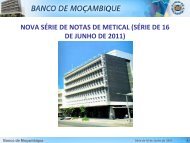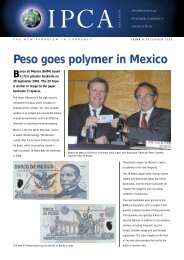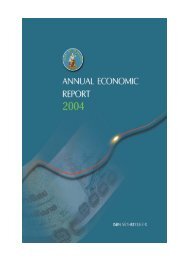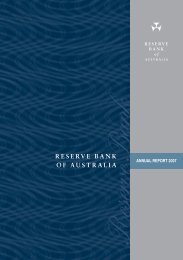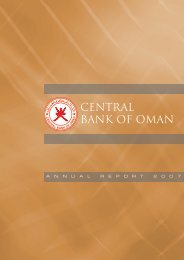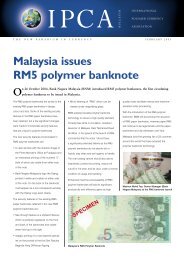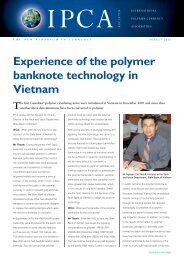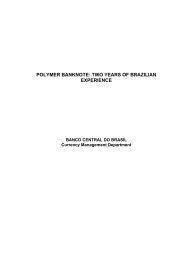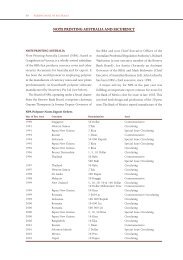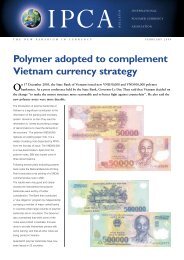Reserve Bank of Australia Annual Report 2011
Reserve Bank of Australia Annual Report 2011
Reserve Bank of Australia Annual Report 2011
You also want an ePaper? Increase the reach of your titles
YUMPU automatically turns print PDFs into web optimized ePapers that Google loves.
Department was part <strong>of</strong> the expert team reviewing mortgage practices and is part <strong>of</strong> a follow-up group<br />
developing an international principles-based framework for sound lending practices. A senior <strong>of</strong>ficial from the<br />
<strong>Australia</strong>n Treasury is participating in a follow-up thematic review <strong>of</strong> compensation practices to assess country<br />
progress since a 2010 review. A thematic review <strong>of</strong> deposit insurance systems was initiated in July <strong>2011</strong>.<br />
<strong>Bank</strong> for International Settlements (BIS)<br />
The BIS and its associated committees have continued to play an important role in the response to recent<br />
challenges, by bringing together high-level <strong>of</strong>ficials from central banks and other financial regulatory bodies to<br />
exchange information and consider lessons from the crisis.<br />
The Governor or Deputy Governor attends the regular bimonthly meetings <strong>of</strong> governors at the BIS, which<br />
discuss the global economic and financial conjuncture. They also participate in meetings <strong>of</strong> the Asian<br />
Consultative Council (ACC), which focuses on financial and monetary developments in Asia and provides<br />
direction for the work <strong>of</strong> the BIS in Asia.<br />
The Assistant Governor (Financial Markets) represents the <strong>Reserve</strong> <strong>Bank</strong> on two BIS committees: the Committee<br />
on the Global Financial System (CGFS) and the Markets Committee. The CGFS discusses vulnerabilities in the<br />
global financial system and structural developments in financial markets, while the Markets Committee focuses<br />
on the implications <strong>of</strong> current events for the functioning <strong>of</strong> financial markets. In the past year, the CGFS has<br />
considered issues such as: the interactions <strong>of</strong> sovereign debt management with monetary and financial<br />
stability; sovereign credit risk and bank funding conditions; macroprudential frameworks and instruments; the<br />
financial stability implications <strong>of</strong> fixed-income strategies <strong>of</strong> institutional investors; and access to central<br />
counterparties in OTC derivatives markets.<br />
The Assistant Governor (Financial Markets) is chairing a Markets Committee study group on high‐frequency<br />
trading in foreign exchange markets. The Head <strong>of</strong> International Department is participating in a CGFS working<br />
group on global liquidity, and a senior manager from the Financial Markets Group is participating in a CGFS<br />
study group on the system-wide implications <strong>of</strong> liquidity regulation.<br />
Basel Committee on <strong>Bank</strong>ing Supervision (BCBS)<br />
The work <strong>of</strong> the BCBS over the past year has focused on finalising the reforms to the key capital and liquidity<br />
standards for banks and other deposit-taking institutions. The reforms, known as Basel III, aim to increase the<br />
resilience <strong>of</strong> the global banking system and ensure greater financial stability, by requiring banks to have more,<br />
and better quality, capital and hold larger amounts <strong>of</strong> liquid assets than prior to the crisis. The changes represent<br />
a major overhaul <strong>of</strong> the standards under which banks will operate. The reform efforts have been led by the<br />
BCBS and its oversight body, the Group <strong>of</strong> Governors and Heads <strong>of</strong> Supervision (GHOS). The Assistant Governor<br />
(Financial System) and the Chairman <strong>of</strong> the <strong>Australia</strong>n Prudential Regulation Authority (APRA) represent<br />
<strong>Australia</strong> on the BCBS, while the Governor and Chairman <strong>of</strong> APRA represent <strong>Australia</strong> on GHOS. Key details <strong>of</strong><br />
the reforms were announced by GHOS following its meetings in July and September 2010. The final package<br />
<strong>of</strong> reforms was presented to the November 2010 G-20 Leaders’ Summit in Seoul before being published by the<br />
BCBS in December 2010.<br />
As reported in the March <strong>2011</strong> Financial Stability Review, one <strong>of</strong> the key issues requiring clarification was the<br />
treatment under the liquidity reforms <strong>of</strong> countries such as <strong>Australia</strong>, where the supply <strong>of</strong> government and<br />
quasi-government securities is limited and banks therefore cannot hold enough eligible liquid assets to meet<br />
the liquidity requirement in that way. To make the requirement workable for countries in <strong>Australia</strong>’s position,<br />
the BCBS’ framework incorporates three alternative treatments for the holding <strong>of</strong> liquid assets. The first option,<br />
and the one that APRA and the <strong>Reserve</strong> <strong>Bank</strong> have agreed should be adopted in <strong>Australia</strong>, involves allowing<br />
banks to establish contractual committed secured liquidity facilities with their central banks, subject to an<br />
ANNUAL REPORT <strong>2011</strong> | International Financial Co-operation<br />
37


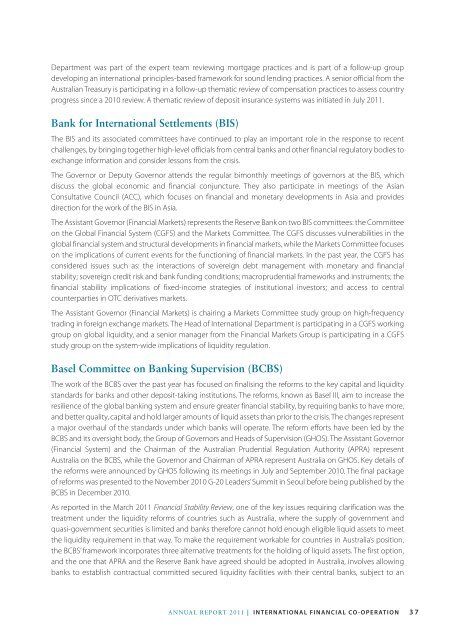
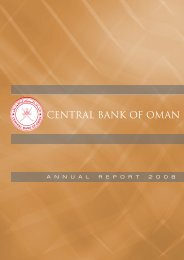
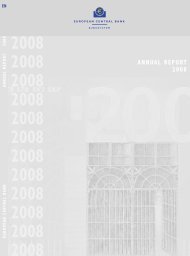
![KNOW YOUR NEW GIBRALTAR BANKNOTES - [Home] bThe/b](https://img.yumpu.com/50890985/1/184x260/know-your-new-gibraltar-banknotes-home-bthe-b.jpg?quality=85)
![PAPUA NEW GUINEA - [Home] - Polymer Bank Notes of the World](https://img.yumpu.com/49758743/1/190x143/papua-new-guinea-home-polymer-bank-notes-of-the-world.jpg?quality=85)

